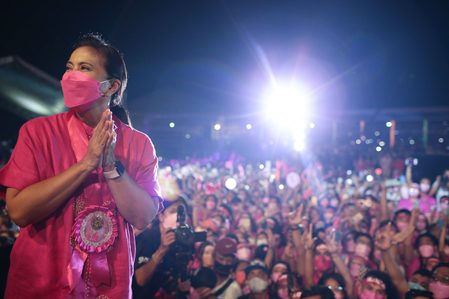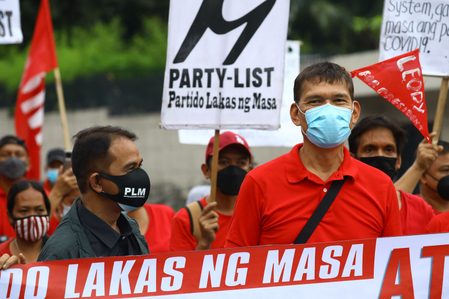SUMMARY
This is AI generated summarization, which may have errors. For context, always refer to the full article.
![[New School] The Philippine Left is at a crossroads this 2022](https://www.rappler.com/tachyon/2022/03/Progressives-Are-at-a-Crossroads-This-2022.jpg)
The Philippine Left has taken two different paths for the 2022 elections: the national and social democratic groups with the big-tent coalition of Vice President Leni Robredo, and the democratic socialists with veteran labor leader Ka Leody de Guzman. These groups differ little in terms of the programs they champion, such as a national minimum wage, the end of contractual labor, pro-farmer land reform, marriage equality, the protection of LGBTQ+ rights, and the legalization of divorce. Likewise, they share a common motivation to prevent Ferdinand “Bongbong” Marcos Jr., son of the former dictator Ferdinand Marcos Sr., from winning the upcoming elections. Where these groups differ is in strategy: how best to achieve these goals.
For the national democrats (those groups that fall under the Makabayan bloc) and the social democrats (mainly Akbayan and its affiliates), the primary goal for the 2022 elections is to prevent a Marcos victory. A broad opposition alliance under the Robredo campaign, they argue, provides the most reliable chance of squaring up toe-to-toe with the dictator’s son. However, the nature of a broad coalition is such that the progressive agendas of these groups will have to be subsumed to the greater interests of the campaign. In order for their interests to reflect onto the Robredo campaign’s platform, they will have to contend for space with established political forces, who may not be interested in rocking the boat too much.
The Robredo campaign is not the first instance of progressives having to compete with the conservative agendas of political dynasties, business elites, and segments of the security sector in a big-tent setting. The People Power movement that toppled Marcos Sr. and buoyed Cory Aquino to the presidency, for example, was a curious alliance of reformists, the Catholic Church, disgruntled factions within the military, and the political parties and personages under the UNIDO grouping.
While the People Power movement’s diversity proved to be a major strength in ousting the Marcos dictatorship, it proved to be a major weakness afterwards. Reformists were quickly sidelined, and social reform efforts stalled as powerful vested interests blocked their implementation. Political dynasties returned en masse to the 8th Congress in 1987 and occupied the vast majority of seats in both chambers. While constitutional democracy was restored, reformists were left with little institutional power to speak of within the new political order.
What institutional toehold progressives have held since has most prominently been in the administrations of presidents who come to power promising to implement packages of social reforms. However, it isn’t to cabinet-based reform forces that presidents tend to answer to, but to the mass of elite politicians in Congress and in provincial and local governments, and to neoliberal technocrats from the big business-to-government revolving door. By playing second fiddle in elite-dominated administrations from Corazon Aquino to Rodrigo Duterte, progressives have inadvertently, in a way, become clients to these patron-politicians, forever seeking (and mostly failing to gain) consistent support for pro-people policies.
Of course, Leni Robredo is no trapo. Hers is a stellar record of working from and with the grassroots, not only as Vice President, but also as a representative in Congress, as a civil society advocate, and as an alternative lawyer. Her sympathies lie with basic sectors, and it is reasonable to assume that she herself wants to back reform programs coming from her Left allies. But the Vice President’s personal inclinations are not the issue here. Rather, it is the social forces that make up her campaign, or more specifically, the tensions between them, and the class interests that encourage them.
It may be the case that the Vice President’s broad base can deliver the votes to defeat the grotesque unity of politicians-turned-political operators manifested in Bongbong Marcos. But pursuing an agenda of deep reform when in power is a wholly different question. Leaving this question unanswered could lead to disenchantment and demobilization, to further weakening. Left groups uneasily allied with traditional politicians and big business now may find themselves sidelined after the elections, with little elbow space to influence or put pressure on a President Robredo.
Enter Ka Leody de Guzman. The socialist labor leader’s campaign is an attempt to chart a course different from the accommodationist approach habitually taken by various Left groups since the fall of the Marcos dictatorship. At the core of this approach is the principle that foiling the Marcos restoration attempt and winning popular support for a progressive agenda is one and the same thing. Why? Because the country’s economic, social, and political institutions are everywhere dominated by a ruling class of robber barons, warlords, and oligarchs.
The Marcos dynasty is one among many dynasties, one part of a larger whole whose collective access to guns, goons, and gold have enabled them to hollow out the democratic project of the EDSA Revolution. Opposition to this ruling class cannot be piecemeal; it must be comprehensive, high-profile, and aimed at raising the political consciousness of those they have victimized. For Ka Leody, the message is the medium: wealth redistribution policies, for example, are aimed not only for legislation, but also to demonstrate to the public that these policies can and do have support from working-class voters, especially in the midst of multiple crises. By exposing the contradiction between grassroots support for these interventions and the actions of leaders in both the public and private sectors, Ka Leody is able to eloquently and convincingly argue for the necessity of the “impossible”: that ordinary people should hold the reins of government. Manggagawa naman.
There are those who argue that the labor leader’s bid for office is not serious, that all this amounts to an elaborate political statement. Do these critics fail to see how he has daringly maximized what precious scant coverage he has gotten from mainstream media to challenge other candidates on their stances on bread-and-butter issues? Or how he has gone to far-flung areas that have never been visited by any presidential candidate in the country’s whole history to highlight struggles faced by locals against powerful interests?
Ka Leody’s campaign has been able to force difficult discussions on social issues that would have been avoided by other candidates were he not running. This in itself is a win. For him to rise from obscurity to national prominence in the span of a few months? Another win. For the Left to find its own voice, its own footing in the country’s highest electoral arena? For it to distinguish itself as a political alternative distinct from an increasingly worn-out liberal reformism? To provide a narrative of democracy rooted in the language of everyday power, and of the need for ordinary people to pry it from the claws of an exploitative elite? Are these not in themselves victories? And do they not offer rich lessons from which other blocs of the Left can learn from after the elections?
Leody de Guzman, unburdened by alliances with factions of the national elite, has provided the historic chance to build the foundations of an independent national progressive constituency of workers, farmers, students, women, LGBTQ+, and other basic sectors. If this does not win today, then I am confident it can win tomorrow, and the day after it. – Rappler.com
John Lazaro is the current National Coordinator of Samahan ng Progresibong Kabataan (SPARK), a socialist youth mass organization. He is a fourth year student at Ateneo de Manila University.
Add a comment
How does this make you feel?
![[Newsstand] No, the Far Left will not support Robredo](https://www.rappler.com/tachyon/2021/11/far-left-robredo-november-30-2021.jpg?fit=449%2C449)


![[WATCH] In The Public Square with John Nery: Preloaded elections?](https://www.rappler.com/tachyon/2023/04/In-the-Public-Square-LS-SQ.jpg?resize=257%2C257&crop=414px%2C0px%2C1080px%2C1080px)
![[Newspoint] 19 million reasons](https://www.rappler.com/tachyon/2022/12/Newspoint-19-million-reasons-December-31-2022.jpg?resize=257%2C257&crop=181px%2C0px%2C900px%2C900px)

![[OPINION] The long revolution: Voices from the ground](https://www.rappler.com/tachyon/2022/06/Long-revolution-June-30-2022.jpg?resize=257%2C257&crop=239px%2C0px%2C720px%2C720px)
![[OPINION] I was called a ‘terrorist supporter’ while observing the Philippine elections](https://www.rappler.com/tachyon/2022/06/RT-poster-blurred.jpeg?resize=257%2C257&crop_strategy=attention)
There are no comments yet. Add your comment to start the conversation.